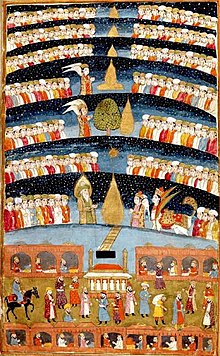
Back ጀነት Amharic الجنة في الإسلام Arabic الجنه فى الاسلام ARZ জান্নাত Assamese İslamda cənnət Azerbaijani Йәннәт Bashkir জান্নাত Bengali/Bangla Džennet BS Исламехь йалсамани CE بەھەشت لەئیسلامدا CKB

In Islam, Jannah (Arabic: جَنَّةٍ, romanized: janna, pl. جَنّٰت jannāt, lit. 'garden')[1] is the final and permanent abode of the righteous.[2] According to one count, the word appears 147 times in the Qur'an.[3] Belief in the afterlife is one of the six articles of faith in Sunni and Twelver Shi'ism and is a place in which "believers" (Mumin) will enjoy pleasure, while the unbelievers (Kafir) will suffer in Jahannam.[4] Both Jannah and Jahannam are believed to have several levels. In the case of Jannah, the higher levels are more desirable, and in the case of Jahannam, the lower levels have a higher level of punishments — in Jannah the higher the prestige and pleasure, in Jahannam the severity of the suffering.[5]: 131-133 The afterlife experiences are described as physical, psychic and spiritual.[6]
| Part of a series on |
| Islam |
|---|
 |
Jannah is described with physical pleasures such as gardens, beautiful houris, wine that has no aftereffects, and "divine pleasure".[6] Their reward of pleasure will vary according to the righteousness of the person.[7][8] The characteristics of Jannah often have direct parallels with those of Jahannam. The pleasure and delights of Jannah described in the Qu'ran, are matched by the excruciating pain and horror of Jahannam.[9][10]
| Islamic eschatology |
|---|
| Islam portal |
Jannah is also referred to as the abode of Adam and Eve before their expulsion.[5]: 165 Most Muslims hold that Jannah and Jahannam co-exist with the temporal world, rather than being created after Judgement Day.[11] Humans may not pass the boundaries to the afterlife, but it may interact with the temporal world of humans.
According to some Islamic teachings, there are two categories of the people of heaven: those who go directly to it and those who enter it after enduring some torment in hell; Also, the people of hell are of two categories: those who stay there temporarily and those who stay there forever.[citation needed]
- ^ "Searchable Hans Wehr Dictionary of Modern Written Arabic" (PDF). giftsofknowledge. p. 138. Retrieved 18 April 2022.
- ^ Joseph Hell Die Religion des Islam Motilal Banarsidass Publishers 1915
- ^ "Paradise In Quran". The Last Dialogue. Retrieved 9 May 2022.
- ^ Thomassen, "Islamic Hell", Numen, 56, 2009: p.401
- ^ a b Lange, Christian (2016). Paradise and Hell in Islamic Traditions. Cambridge United Kingdom: Cambridge University Press. ISBN 978-0-521-50637-3.
- ^ a b "Eschatology (doctrine of last things)". Britannica. Retrieved 18 April 2022.
- ^ Emerick, Yahiya (2011). The Complete Idiot's Guide to Islam (3rd ed.). Penguin. ISBN 9781101558812.
- ^ Tom Fulks, Heresy? The Five Lost Commandments, Strategic Book Publishing 2010 ISBN 978-1-609-11406-0 p. 74
- ^ Thomassen, "Islamic Hell", Numen, 56, 2009: p.405
- ^ Smith & Haddad, Islamic Understanding, 1981: p.86
- ^ Lange, Christian (2016). "Introducing Hell in Islamic Studies". Locating Hell in Islamic Traditions. BRILL. p. 12. ISBN 978-90-04-30121-4. JSTOR 10.1163/j.ctt1w8h1w3.7.